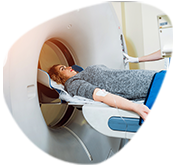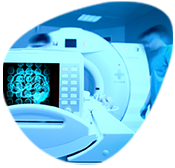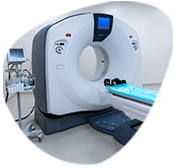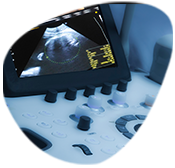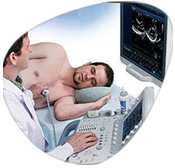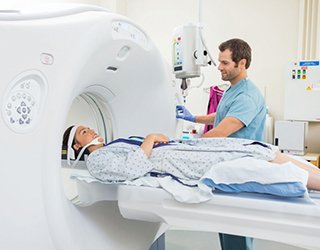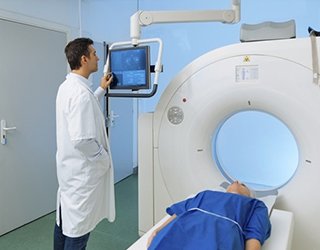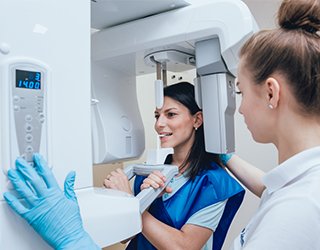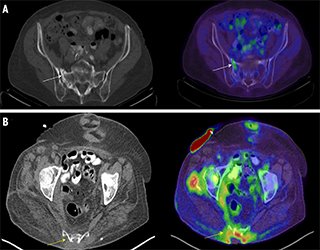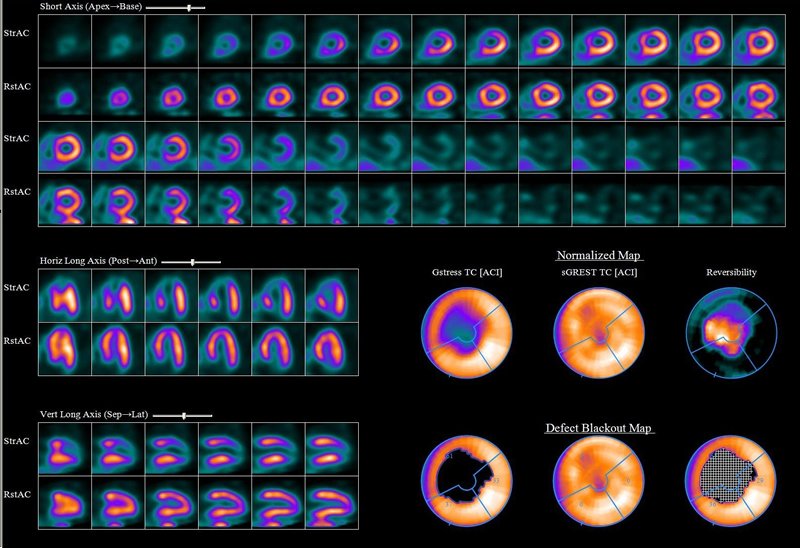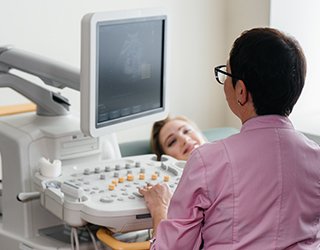X-ray (Radiography) - Lower GI Tract
- Home>
- X-ray (Radiography) – Lower GI Tract


Lower gastrointestinal (GI) tract radiography, also called a lower GI or barium enema, is an x-ray examination of the large intestine, also known as the colon. This examination evaluates the right or ascending colon, the transverse colon, the left or descending colon, the sigmoid colon and the rectum. The appendix and a portion of the distal small intestine may also be included.
An x-ray (radiograph) is a noninvasive medical test that helps physicians diagnose and treat medical conditions. Imaging with x-rays involves exposing a part of the body to a small dose of ionizing radiation to produce pictures of the inside of the body. X-rays are the oldest and most frequently used form of medical imaging.
The lower GI uses a special form of x-ray called fluoroscopy and a contrast material called barium or a water soluble iodinated contrast.
Fluoroscopy makes it possible to see internal organs in motion. When the lower gastrointestinal tract is filled with barium, the radiologist is able to view and assess the anatomy and function of the rectum, colon and sometimes part of the lower small intestine.
An x-ray (radiograph) is a noninvasive medical test that helps physicians diagnose and treat medical conditions. Imaging with x-rays involves exposing a part of the body to a small dose of ionizing radiation to produce pictures of the inside of the body. X-rays are the oldest and most frequently used form of medical imaging.
The lower GI uses a special form of x-ray called fluoroscopy and a contrast material called barium or a water soluble iodinated contrast.
Fluoroscopy makes it possible to see internal organs in motion. When the lower gastrointestinal tract is filled with barium, the radiologist is able to view and assess the anatomy and function of the rectum, colon and sometimes part of the lower small intestine.
Your physician will give you detailed instructions on how to prepare for your lower GI imaging.
You should inform your physician of any medications you are taking and if you have any allergies, especially to iodinated contrast materials. Also inform your doctor about recent illnesses or other medical conditions.
On the day before the procedure you will likely be asked not to eat, and to drink only clear liquids like juice, tea, black coffee, cola or broth, and to avoid dairy products. After midnight, you should not eat or drink anything. For adults (but not usually in children), it is important that your colon be completely empty for the procedure. You may also be instructed to take a laxative (in either pill or liquid form) and to use an over-the-counter enema preparation the night before the examination and possibly a few hours before the procedure. Just follow your doctor's instructions. You can take your usual prescribed oral medications with limited amounts of water.
You may be asked to remove some or all of your clothes and to wear a gown during the exam. You may also be asked to remove jewelry, removable dental appliances, eye glasses and any metal objects or clothing that might interfere with the x-ray images.
Women should always inform their physician and x-ray technologist if there is any possibility that they are pregnant. Many imaging tests are not performed during pregnancy so as not to expose the fetus to radiation. If an x-ray is necessary, precautions will be taken to minimize radiation exposure to the baby. See the Safety page for more information about pregnancy and x-rays.
Infants and children may undergo lower GI radiography. Usually, there is no special preparation, but your doctor will give you detailed instructions to prepare your child for the examination. The use of barium and the taking of x-ray images is similar to that described for adults.
You should inform your physician of any medications you are taking and if you have any allergies, especially to iodinated contrast materials. Also inform your doctor about recent illnesses or other medical conditions.
On the day before the procedure you will likely be asked not to eat, and to drink only clear liquids like juice, tea, black coffee, cola or broth, and to avoid dairy products. After midnight, you should not eat or drink anything. For adults (but not usually in children), it is important that your colon be completely empty for the procedure. You may also be instructed to take a laxative (in either pill or liquid form) and to use an over-the-counter enema preparation the night before the examination and possibly a few hours before the procedure. Just follow your doctor's instructions. You can take your usual prescribed oral medications with limited amounts of water.
You may be asked to remove some or all of your clothes and to wear a gown during the exam. You may also be asked to remove jewelry, removable dental appliances, eye glasses and any metal objects or clothing that might interfere with the x-ray images.
Women should always inform their physician and x-ray technologist if there is any possibility that they are pregnant. Many imaging tests are not performed during pregnancy so as not to expose the fetus to radiation. If an x-ray is necessary, precautions will be taken to minimize radiation exposure to the baby. See the Safety page for more information about pregnancy and x-rays.
Infants and children may undergo lower GI radiography. Usually, there is no special preparation, but your doctor will give you detailed instructions to prepare your child for the examination. The use of barium and the taking of x-ray images is similar to that described for adults.
As the barium fills your colon, you will feel the need to move your bowel. You may feel abdominal pressure or even minor cramping. Most people tolerate the mild discomfort easily. The tip of the enema tube is specially designed to help you hold in the barium. If you are having trouble, let the technologist or radiologist know.
During the imaging process, you will be asked to turn from side to side and to hold several different positions. At times, pressure may be applied to your abdomen. With air contrast studies of the bowel (air contrast barium enema), the table may be moved to an upright position.
After the examination, you may be given a laxative or enema to wash the barium out of your system. You can resume a regular diet and take orally administered medications unless told otherwise by your doctor. You may be able to return to a normal diet and activities immediately after the examination. You will be encouraged to drink additional water for 24 hours after the examination.
Your stools may appear white for a day or so as your body clears the barium liquid from your system. Some people experience constipation after a barium enema. If you do not have a bowel movement for more than two days after your exam or are unable to pass gas rectally, call your physician promptly. You may need an enema or laxative to assist in eliminating the barium.
During the imaging process, you will be asked to turn from side to side and to hold several different positions. At times, pressure may be applied to your abdomen. With air contrast studies of the bowel (air contrast barium enema), the table may be moved to an upright position.
After the examination, you may be given a laxative or enema to wash the barium out of your system. You can resume a regular diet and take orally administered medications unless told otherwise by your doctor. You may be able to return to a normal diet and activities immediately after the examination. You will be encouraged to drink additional water for 24 hours after the examination.
Your stools may appear white for a day or so as your body clears the barium liquid from your system. Some people experience constipation after a barium enema. If you do not have a bowel movement for more than two days after your exam or are unable to pass gas rectally, call your physician promptly. You may need an enema or laxative to assist in eliminating the barium.
Other Guidlines


